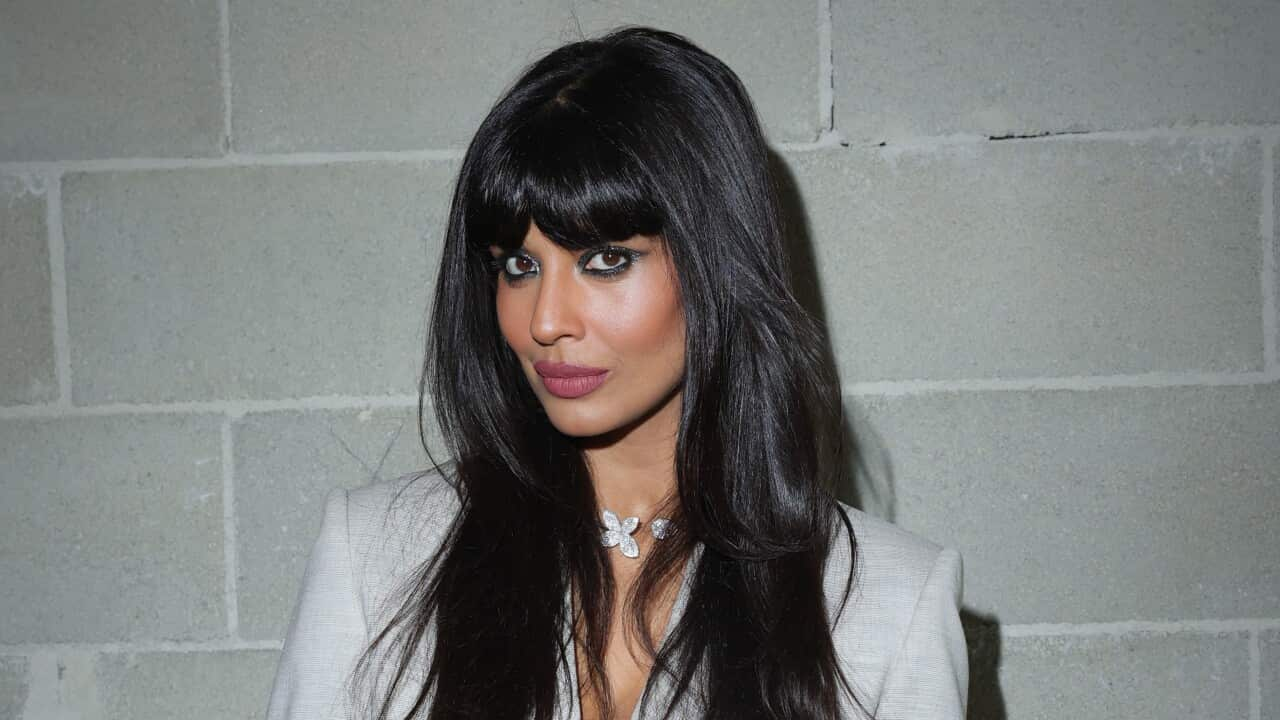This article contains references to eating disorders.
Jameela Jamil is the first to admit she's not perfect.
In fact, it's something the English actor, writer, podcaster, and advocate actively embraces.
"Women have this pressure that is put upon us — and then we put upon ourselves — that we have to be perfect from the start," she says ahead of her "very fun, very unfiltered" Australian speaking tour.
Best known for her roles in The Good Place and Marvel's She-Hulk, Jamil has garnered a loyal following for her direct, passionate, and often humorous commentary on everything from body image, mental health, and gender equality to , disability, and LGBTIQ+ rights.

Jamil starred in The Good Place, a comedy set in the afterlife, alongside legendary actor Ted Danson. Source: Supplied / NBC
"I think the reason I've made it quite far in my life for someone who came from nothing and didn't know anyone, had no connections, is because I have the audacity of a man," says Jamil.
I have the audacity to know that it's not my responsibility to be perfect when I just start trying something for the first time.
"I don't know if I'm going to be good at it, but I throw myself in and I am proud of myself for that."
It's an attitude that the 39-year-old credits with giving her a life that's a far cry from the "dignified" one she envisioned when she was younger.

Jamil grew up wanting to be a doctor. She says her younger self would probably think she's "a massive goon" and be "very embarrassed" by her. Source: Instagram / Jameela Jamil
An unconventional path to fame
A chance encounter with a producer in a London pub in 2008 led Jamil, who was working as an English teacher, to land a job as a TV presenter.
She later moved into radio presenting, becoming the first female solo host of BBC Radio 1's Official Chart show, before upping sticks to Los Angeles to pursue screenwriting.
It was there, after securing her first-ever acting role in 2016 as British socialite Tahani Al-Jamil in the hit TV series The Good Place, that she found global fame.

Jameela Jamil (right) rose to prominence in the UK as a presenter on the youth entertainment show T4. Source: Getty / Ian West - PA Images
"I don't know how to not say anything," she says.
"It doesn’t feel like there’s a choice whether or not you can say something when you see injustice."
Jamil's growing frustration with women's value being measured by a number on the scale led the self-described "feminist-in-progress" to found the I Weigh movement in 2018.
"If you want something to change, if you complain about a problem, then surely it would only make sense, logically, to try and do something about it?" she says of her advocacy efforts.

After Jamil's post went viral, she turned it into social media movement. Source: Instagram / Jameela Jamil
While Jamil's unashamed outspokenness and advocacy have been praised by many and led to plaudits such as being named one of Time magazine's 25 most influential people in 2019, she cringes at being put on a pedestal or viewed as "some type of guru or master".
It's not a call to arms … I'm more trying to start big, public conversations about [these issues] so we can stop just being lulled into submission all of the time.
"It's normal to care. It's not normal to not care."
'Pretty privilege' and pile-ons
Naturally, there have been questions about whether a statuesque, conventionally attractive cisgender woman (Jamil's name literally means "beautiful" in Arabic) in Hollywood is qualified to speak about issues like diet culture and fatphobia, particularly when much of the associated harm is perpetuated by celebrities and influencers.
Jamil acknowledges she is more privileged than most. At the same time, she has experienced firsthand the long-term harm that comes with trying to meet unrealistic and ever-changing beauty standards, as well as how brutally women, particularly those in the public eye, can be treated for simply existing.
Early in her career, Jamil was subject to tabloid scrutiny in the UK, which criticised her for being too thin and then later mocked her for gaining weight as a result of medication she was taking.
At the same time, she was battling an eating disorder that had developed in her teens, something Jamil says has caused lasting damage to her bone density, digestive system, kidneys, liver, and heart.
She says part of the pull to conform to beauty standards stems from an underlying desire to belong.
"There's this feeling of 'I'll be left behind if I don't obey the group and do the thing that will allow me to be included,' because it's real that if you are skinnier or you look younger or you have pretty privilege, you're more likely to be included."
As well as speaking publicly about the racism, classism and appearance-based abuse she experienced growing up — — Jamil has been vocal about the impact of multiple chronic health conditions she's experienced throughout her life, such as Ehlers-Danlos syndrome, post-traumatic stress disorder, depression, anxiety, mercury poisoning and coeliac disease.
Her propensity to be an "open book" about her life has sometimes come back to bite her. In 2020, a string of Instagram posts went viral, alleging Jamil had fabricated details about her injuries and illnesses.
The author of the posts even went so far as to suggest Jamil had Munchausen syndrome, a mental disorder in which a person fakes or exaggerates illness to gain attention and sympathy.
Jamil publicly refuted the claims, as did her long-term partner, musician James Blake, saying they highlighted how people with chronic health conditions and invisible disabilities are often disbelieved.
While Jamil has endured her fair share of trolling and abuse online, not all of the criticism levelled at her has been unjustified.
One such example is her past "slut-shaming" of other female celebrities, including Miley Cyrus, Beyonce, and Rihanna.

Jamil lives in Los Angeles with her boyfriend, English musician James Blake. Source: Getty / David Crotty/Patrick McMullan
"But you can regret something and still be glad that you did it because that's how I learned what to do differently next time," she says of how she used to communicate online.
"If I hadn't made those mistakes, I wouldn't have then gone on to go, 'Oh, okay, I actually need to change course', and this has made me a better and wiser person."
'Perfection is the enemy of progress'
In fact, self-accountability has become a core tenet of Jamil's advocacy.
Amid the rise of far-right extremism around the world, infighting among the left, and some hard-won rights and freedoms, particularly for women, "taking a huge backswing", Jamil's belief that "perfection is the enemy of progress" is perhaps more vital than ever.
"We don't really have time for everyone to wait to be the perfect feminist or the perfect activist," she says.
You just have to scrap in now before we end up in a bunch of red coats with white bonnets.

Jamil has waged a war against diet culture and beauty standards. Source: Instagram / Jameela Jamil/Stylist Magazine
Rather, she says, it's "by design".
"The only reason any grown adult man would want a grown adult woman to look and behave and have the body of a barely pubescent girl is to keep her small in every way; make sure she's not eating enough so she's not got the strength to fight for her rights, make sure she's consumed and worried and panicking over every tiny 'imperfection' on her face so she's distracted, she doesn't have time to organise; make sure she's not sleeping enough, make sure she's got low self-esteem."

Jamil was named one of Glamour's magazine's women of the year in 2024. Source: Getty / Karwai Tang
"It's honestly creeped me out watching grown women in 2025 lap it up again as if we learned nothing in the last 10 years," she says while also emphasising she supports people's right to do what they want to their own bodies.
"It's like Eternal Sunshine of the Spotless Mind happened, and everyone's brains just got wiped of everything that we all collectively discussed, because we have Stockholm syndrome for the patriarchy — and we have to just own that."
'We're all guilty of it'
Jamil, admittedly, isn't entirely immune to the pressure to conform.
"There's no way I would wear the dresses I wear if I didn't live with a man that I wanted to sleep with. I would be wearing much more comfortable clothes, I wouldn't wash my hair, I don't think I'd brush my teeth," she says with a laugh.
"We're all guilty of it — but to what extent are you willing to punish or risk your body, your life, and your mental and physical health for a patriarchal standard?"
The beauty and diet industry will always make sure that you feel like a pig, no matter what you do.
The cyclical and, at times dangerous nature of beauty standards is largely why Jamil has sworn off undergoing cosmetic surgery and treatments, such as.

"I hated being young, I love being older, I don't want any memory of what life was like when I was too young to have any wrinkles," says Jamil Source: Getty / Marla Aufmuth
"I want my 85-year-old self to like who I am now. I want her to feel like I was looking out for her, that I was excited for her arrival, and I wasn't dreading it, and doing everything I could to avoid it.
"I don't want to preserve youth forever … These wrinkles that I'm getting are ones that have been formed from me frowning and figuring out how f**ked the world is, and I'm glad for them. They're lines of wisdom."
Finding humour in disaster
With so much heaviness in the world right now, Jamil's focusing her energy on injecting more humour into her work.
"Everything's getting too dark. It's too dark. I can't take it anymore. I'm going to explode," she says.
"We all need a release."
Next month, she's launching a new comedy podcast, Wrong Turns, which will feature "some of the funniest people in the world" sharing their "best disaster stories".
"Every time you hear about something terrible or embarrassing happening to someone, there's always this need for us to turn it into an inspirational, teachable moment … [but] sometimes you don't get wiser.
"Sometimes things are just shit, and we need to accept that and laugh about it."
An Evening with Jameela Jamil will take place at Sydney's State Theatre on 26 April, Brisbane's QPAC Concert Hall on 27 April, and Melbourne's Hamer Hall on 28 April.
Readers seeking support for body image concerns and eating disorders can contact Butterfly Foundation on 1800 33 4673. More information is available at



